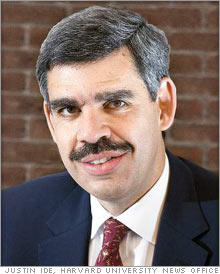"By almost every indicator, the US economy is finally on the road to recovery."
"The New Normal" is a concept discussed by President and advisers frequently. "We are very far from normal."
Current unemployment rates reflect a severe shortfall, a collapse of aggregate demand as an effect of the financial crisis that caused a loss of wealth, disruptions of credit, devastation of state and local government budgets, greater caution on the part of consumers and firms, and fall in output around the world. The "rise in long-term unemployment is the almost-inevitable consequence of the severe recession." Romer emphasizes "there is every reason to expect that long-term unemployment will come back down when aggregate demand recovers."
Challenges reduced but not yet eliminated are credit that remains tight, businesses aren't hiring, state governments have budget shortfalls...It's currently "a replay of what happened during the recovery from the Great Depression."
Christina Romer, President Obama, Lawrence Summers
Photo by Pool/Getty Images North America
Consumption is not likely to be "the main engine of a strong recovery." Monetary policy is "unusually tight given the condition of the economy". We are"growing again, but not booming". The economy is "not predicted to reach normal levels for an extended period...There are limits on the role government can play."
"What More Can We Do?"
a) "Our focus as policymakers should be on how we can help the private sector recover faster."
b) tax incentives for businesses to employ and retain workers.
c) "additional fiscal relief to the states" extend unemployment insurance benefits extensions, caused by shortages of jobs not workers, and provide capital to small banks to lend to small businesses.
d) open markets to US goods, to move "global economy to more balanced growth."
e) energy conservation through rebate programs.
Rapid recovery can "help ensure that unemployment does not remain permanently higher". Return of economy to normal is "both possible and a policy imperative...High unemployment is a disaster for the economy"and "more importantly, a tragedy for those affected."
Can we do better than "just get back to where we were before the recession?" "Could good economic policies lead to economic growth that is stronger and more durable than before?" The answer, Romer says, is yes, with these economic transformations:
1. "Dealing with the Budget Deficit": "budget problem was years in the making." To get fiscal house in order, health reform legislation include mechanisms experts say will "slow the growth of health care costs over time...Vigilance on "implementation of the reforms" is necessary "to make sure that those mechanisms work" and a range of other measures are needed.
2. "Rebalancing Demand": higher personal savings and investment are the goals. New investments in clean energy, biotechnology, healthcare and information technology are better than borrowing, consumption spending and "unsustainable" construction.
3. "Financial regulatory reform" : new sets of rules needed to "curb destructive bubbles" require greater accountability of Wall Street, consumer protections, new rules for financial system - a "regulatory framework where capital and liquidity requirements control excessive risk-taking and where regulators consider risks to the system as a whole and not just to individual institutions."
4."Investing in Education and Innovation": with investments in education, basic science, new labs and research facilities.




